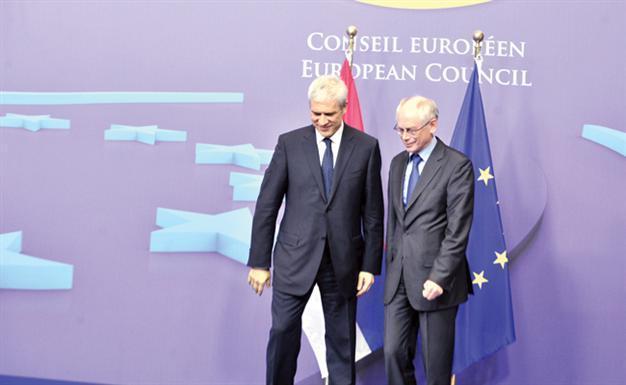Serbia makes historic leap into European club
BRUSSELS

EU Council president Van Rompuy (R) welcomes Serbian President Tadic on Feb 28, prior a working session at the EU Headquarters in Brussels. AFP photo
European Union leaders formally made Serbia a candidate for membership in the bloc in a remarkable turnaround for a country considered a pariah just over a decade ago.“European Council grants Serbia EU candidate status,” EU president Herman Van Rompuy said on microblogging website Twitter as the bloc’s 27 leaders ushered in Belgrade in recognition of its efforts to defuse tension with breakaway Kosovo.
The decision to grant Belgrade official EU candidate status marks a historic leap for a country only 13 years ago the target of a NATO bombing campaign.
Serbian President Boris Tadic welcomed the EU’s decision, saying it paved the way for “economic advance and prosperity.” Serbia’s 2009 application, launched in the throes of the financial crisis and amid worries that the EU had expanded too far and too fast in its 2004 “big bang” enlargement, has been fraught with problems. Seen as a shoo-in for membership after last year’s arrest of Balkans war criminals Ratko Mladic and Goran Hadzic after almost two decades on the run, Belgrade had been suddenly held back and told to do more for regional peace by easing ties with Kosovo.
While staunchly refusing to recognize Kosovo’s 2008 independence, Serbia joined an EU-sponsored dialogue with its former province a year ago, aimed at smoothing tensions and overcoming daily headaches caused by the border row – problems such as disrupted roads, railways and telecommunications.
But Belgrade’s hopes of a subsequent EU pat on the back at a December summit were dashed notably by Britain and Germany, among 22 EU nations to have recognized Kosovo. But last week, Serbia and Kosovo, both keen to inch closer to the bloc, staged a key breakthrough. In an 11th-hour deal days before the EU summit deadline, Belgrade agreed to allow Kosovo to speak under its flag in regional meetings and to sign international agreements like any other fully recognized nation.
The two sides also agreed to jointly manage their flashpoint border, scene of recurrent clashes in past months between NATO peacekeepers and Serbs who make up the majority in northern Kosovo but refuse to recognize Pristina’s independence.
“Serbia deserves candidate status,” said European Commission President Jose Manuel Barroso.
A decision on Serbia’s bid had been expected earlier this week at EU ministerial talks but was blocked when Romania wielded its veto against opening the EU door to Belgrade, a decision requiring a unanimous vote. Removing a last potential hitch, Serbia did a deal with Romania ahead of March 1’s summit to mutually respect the rights of each other’s minority groups.
Of the six nations once part of the former Yugoslavia, Slovenia joined the EU in 2004 while Croatia is to be anointed the 28th member next year. Macedonia and Montenegro are both official candidate countries but have yet to be approved for opening formal adhesion negotiations, a process that can take years. Politically divided Bosnia has made no move toward the EU.
Compiled from AFP and AP stories by the Daily News staff.
















